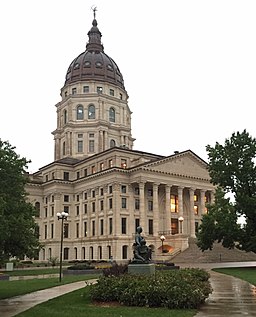Kansas state legislators have wrapped things up in Topeka, and below, you will find a reflection on the 2023 Kansas State Legislative Session written by John Shively, Lead Coordinator of the Sisters of Charity of Leavenworth Office of Justice, Peace, and Integrity of Creation (JPIC). John’s reflection talks about some of the common trends noticed in the bills introduced & passed this year, what the JPIC Office worked on, and how we can continue working on these issues going forward.

Dear friends and fellow advocates,
As I reflect on this legislative session, I am reminded that the Capitol building in Topeka is a challenging place to hold on to hope. This session had much of what is usual to us — raw power politics on display, the punishment of those who dared to vote on the side of the poor and the marginalized, and a complete unwillingness to act on key issues supported by most Kansans such as Medicaid expansion and allowing for medical marijuana. Yet, in many ways, this session felt uniquely cruel and challenging. Former speaker of the U.S. House Tip O’Neill coined the phrase, “all politics is local,” to describe that politicians are most successful when they listen to their constituents and the desires of their local district. Unfortunately, increasingly, the politics in Topeka seem to follow the rule that all politics is national. From the nationwide trend of writing legislation targeting transgender persons to giving hearings to out-of-state lobbying groups from Texas pushing legislation that punishes homeless people and Florida that makes it harder for families to put food on the table.
Some legislators also continue to thumb their nose at our Democratic form of government, from Republican Senator Mike Thompson (Johnson County) saying on the floor that “voting is a privilege” to the introduction of a slew of bills restricting access to the ballot box, there was no shortage of attempts to limit our ability to participate in elections. While many of these bills failed, they were, unfortunately, able to pass a bill that eliminates the three-day grace period for advance voting ballots from current law.
Yet, hope is not gone. As Cornel West puts it:
“But hope is something else, you see, because hope is not spectatorial. It’s participatory. You’re already in the mess. You’re in the funk. What are you going to do? Hope is a verb as much as a virtue. Hope is as much a consequence of your action as it is a source of your action, as Roberto Unger always said.”
Each friend, individual, and organization that shows up to the legislature each year to fight with the poor, the marginalized, and the voiceless—that’s hope. Every letter, phone call, e-mail, or signature you send—that’s hope. Every piece of testimony written and submitted—that’s hope. In a system that would rather we remain quitet in the face of injustice, showing up is hope.
I was reading an interview with artist Ben Wildflower, who spoke about his view of Marian spirituality:
“Mary gave birth in a world hell-bent on killing her child, a world that eventually did kill her child… Mary teaches me a Christianity that’s not fixated on some otherworldly or abstract spirituality. She teaches us to cradle the fragile mortal flesh and blood, betting our whole life on the weak and defenseless, siding with the doomed, weeping at the atrocities we saw coming. Mary attends to her child even after he’s dead. I don’t know if Mary at the foot of the cross had any hope, but I can’t help but think that after hearing her son scream that God had abandoned him, she may have had no hope too, but she stuck around and bore witness anyway. It’s a harsh world, and I don’t see hope or belief as some kind of obligation. I just want to join the Marian practice of staying put in the places God has abandoned.”
Every year, I am grateful to be a part of this community of advocates who stay put, who bear witness, who “cradle the fragile mortal flesh and blood.” ,I am proud of the work that we have done, from the testimony submitted by Sr. Vickie Perkins and Sr. Therese Bangert which helped defeat the bill that would have criminalized homelessness, to JPIC Coordinator Rebecca Metz’s testimony which continued to lift up the need to eliminate the state sales tax on groceries, to the Catholic Sisters of Kansas’ rally at the statehouse for Medicaid Expansion., No one can do this work alone!
If you want to read more about what passed and what did not during the session, you can read Kanas Rural Center’s Legislative and Policy Watch Updates here: https://kansasruralcenter.org/policy-watch
In hope,
John Shively
Sisters of Charity of Leavenworth, JPIC Lead Coordinator